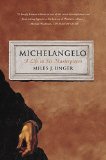Summary | Excerpt | Reviews | Beyond the Book | Readalikes | Genres & Themes | Author Bio

Critics' Opinion:
Readers' Opinion:
First Published:
Jul 2014, 448 pages
Paperback:
Jul 2015, 448 pages
 Book Reviewed by:
Book Reviewed by:
Suzanne Reeder
Buy This Book
Michelangelo's long, illustrious career marks the point at which the artist definitively transcends his humble origins in the laboring class and takes his place alongside scholars and princes of the Church as an intellectual and spiritual leader. As Michelangelo's fame spread, some of his patrons persisted in treating him as little more than a household servant—albeit of a particularly eccentric and disobedient sort—but many contemporaries acknowledged that he was a new kind of artist, indeed a new kind of man, a secular saint who was to be exalted but also feared. Even someone as powerful as Pope Leo X was daunted by the prospect of employing him, grumbling, "[H]e is terrible, as you see. It is impossible to work with him." Leo's cousin, Pope Clement VII, was more amused than outraged at his servant's insubordination. When Buonarroti comes to see me," he said, laughing, "I always take a seat and bid him to be seated, feeling that he will do so without leave."
Michelangelo's determination to chart a new course embroiled him in endless quarrels as his claim of superiority clashed with his employers' own considerable egos. While patrons tended to regard him and his colleagues as, at best, highly trained professionals tasked with carrying out their vision, Michelangelo insisted on an unprecedented degree of freedom to pursue his own vision, on his own terms. Cardinal Cervini (soon to be elected Pope Marcellus II), in charge of overseeing the rebuilding of St. Peter's, was one of many who discovered how difficult it was to control the headstrong artist. When he asked Michelangelo to inform him of his plans, the artist snapped; "I am not obliged, nor do I intend to be obliged to say either to your highness or to any other person what I am bound or desirous to do." Even when his relationship with a patron was one of mutual respect, Michelangelo chafed at any restrictions placed on his freedom. "If Your Holiness wishes me to accomplish anything," he wrote to Pope Clement VII, "I beg you not to have authorities set over me in my own trade, but to have faith in me and give me a free hand. Your Holiness will see what I shall accomplish and the account I shall give of myself."
Michelangelo's greatest achievement was to fuse the artist and his work. He was the prototype of the temperamental genius, beholden to no one and responsible only to the dictates of his own inspiration. The term terribilità—the power to inspire awe and terror—was transferred by some subtle alchemy from the artist to his paintings and sculptures, and then back again, so that the man and his work became one. Michelangelo himself tended to blur the line between life and art. Asked why he never married, he responded, "I have too much of a wife, which is this art that has always given me tribulation, and my children will be the works that I shall leave." In a sonnet, he took this analogy one step further, writing of his unforgiving muse:
This savage woman, by no strictures bound,
Has ruled that I'm to burn, die, suffer. . . .
My blood, however, she drains pound by pound;
She strips my nerves the better to undo
My soul. . . .
Fueled by his outsized ambition and stamped by his outsized personality, these epic paintings and monumental sculptures reflect their creator; they are an expression of his will and a mirror held up to his turbulent soul. It required a leap of faith to commission a work from such a master, since it was certain to defy convention. When finally unveiled to a curious public, the work was likely to challenge not only artistic precedent but often orthodoxy itself. In the case of The Last Judgment, the outcry from indignant Christians was so loud that even the pope could not resist their calls to cover up the most offensive parts. Those who preferred to play it safe simply hired more pliant servants.
Excerpted from Michelangelo by Miles J Unger. Copyright © 2014 by Miles J Unger. Excerpted by permission of Simon & Schuster. All rights reserved. No part of this excerpt may be reproduced or reprinted without permission in writing from the publisher.




Information is the currency of democracy
Click Here to find out who said this, as well as discovering other famous literary quotes!
Your guide toexceptional books
BookBrowse seeks out and recommends the best in contemporary fiction and nonfiction—books that not only engage and entertain but also deepen our understanding of ourselves and the world around us.